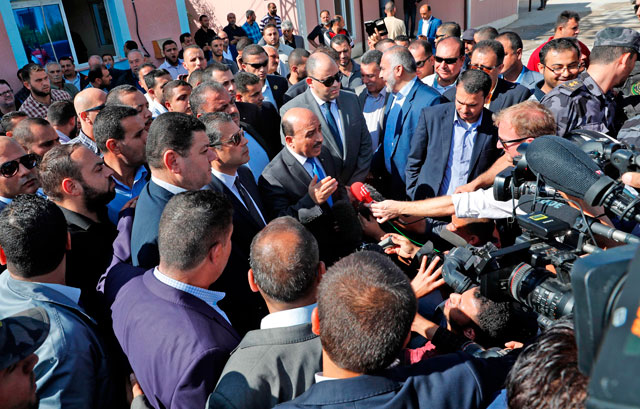GAZA CITY, Palestinian Territories — Hamas has passed the first test of a reconciliation agreement by giving up control of the Gaza Strip’s borders, but sterner challenges await in the bid to end its 10-year rift with rival Fateh.
It was the first step in an Egyptian-brokered accord agreed last month, under which the Palestinian Authority (PA) is due to take control of the Gaza Strip by December 1.
The West Bank-based PA, led by President Mahmoud Abbas, welcomed Wednesday’s handover but has not ended punitive measures against Gaza that have added to humanitarian suffering.
Other issues left to resolve include the future of Hamas’ 25,000-strong armed wing, with the Islamist movement so far refusing to disarm.
Some analysts say Hamas, steered by new Gaza chief Yahya Sinwar, has shifted position and is keen to hand over political, though not military, power.
The fate of Hamas’ armed wing is seen as non-negotiable, and could ultimately bring down the agreement.
The Islamist movement has run Gaza since seizing it in a near civil war with Abbas’ Fateh in 2007.
Stepping back
The exact terms of the border handover were ironed out in a meeting late Tuesday.
Officials present, speaking on condition of anonymity, said Hamas actually offered more than the PA had asked for, agreeing to withdraw all their staff from the borders.
The handover will bring the PA a financial windfall from tax revenues collected at the borders.
While multiple previous reconciliation pushes have failed, Hamas has never taken as big a step, said Jamal Al Fadi, professor of international relations at the Al Azhar university in Gaza.
“It is an important and bold step for Hamas and a clear sign that it is irreversibly pursuing reconciliation,” he said.
Hamas’s calculation, said Mukaimer Abu Saada, a political analyst, is that such concessions can reduce the pressure on them over the humanitarian suffering in Gaza.
Since Hamas took control a decade ago, the 2 million Gazans have seen living conditions worsen.
The enclave suffers from desperate shortages of electricity, a lack of clean water and more than 40-per cent unemployment.
Israel’s three aggressions against Gaza since 2008 have left devastation, while the Jewish state maintains a crippling blockade on the strip.
In addition, this year the PA has imposed new sanctions, including reducing electricity payments.
Egypt has also largely closed its border in recent years, though it could reopen if the reconciliation process continues, with talk of November 15 as a possible date.
“This relieves Hamas of its responsibilities for the crisis in Gaza and gives it to president Abbas,” Abu Saada said.
The president, however, is wary of responsibility without real authority, Abu Saada added.
In particular he rejects a situation akin to Lebanon, where Hizbollah maintains a military arsenal independent of the army.
Hamas has shown no willingness to disarm its armed wing, the Ezzedine Al Qassam Brigades.
On Monday, seven Gazan militants were killed when Israel blew up an attack tunnel stretching from the strip into its territory.
“Hamas can show great flexibility on all issues except on the weapons of the Qassam Brigades, which it considers a red line,” Abu Saada added.
Hamas officials stress that Qassam’s weapons were not discussed in the Egyptian negotiations last month, and the agreement signed on October 12 does not stipulate they disarm.
So far Abbas has shown no willingness to remove punitive measures.
Hugh Lovatt, Israel-Palestine analyst for the European Council on Foreign Relations, said Hamas would struggle to maintain support within its own ranks if Abbas does not take steps to remove the measures.
“If there are no improvements on the ground it will be very difficult for Hamas to justify why they are making these concessions,” he told AFP.
International concern
Israel and the United States have said Hamas must disarm and recognise Israel to be part of any future unity government.
The United Nations welcomed Wednesday’s withdrawal, but the United States did not immediately react.
The PA is heavy reliant on US aid.
Ofer Zalzberg, senior analyst for the Middle East for the International Crisis Group, said Israeli Prime Minister Benjamin Netanyahu would prefer it if there were no deal.
“They can live with this part of it [the border crossings], but they have clearly indicated their opposition to further steps.”
He said he believed that Netanyahu’s office still thought the deal would collapse and that the United States does not support real reconciliation involving Hamas.
The division between the Palestinian factions has helped Netanyahu justify why there was little movement with the peace process, Zalzberg said.
But if Hamas were to become part of the PA government, Zalzberg said he believed Netanyahu would change tack and argue the government had endorsed violence.
“The reason he can live with the return of the PA to Gaza is it helps him say that there is no longer a partner [for peace].”
